Analyzing the Peacemakers' Responsibility in the WWII Outbreak
VerifiedAdded on 2020/10/07
|8
|2297
|258
Essay
AI Summary
This essay analyzes the role of the peacemakers at the 1919 Paris Peace Conference in the outbreak of World War II. It argues that their focus on national interests, failure to establish a strong international peace-keeping force, and the mandates imposed on Germany, particularly Article 231 (the War-Guilt Clause) of the Treaty of Versailles, inadvertently created the conditions that led to the rise of Nazi Germany and ultimately, WWII. The essay highlights how the peacemakers' actions, such as the US's non-participation in the League of Nations and the harsh economic reparations imposed on Germany, fostered resentment and instability, paving the way for Hitler's exploitation of these grievances to gain power and initiate the war. The author emphasizes that while Nazi Germany's expansionist policies were a direct cause, the decisions made by the peacemakers were crucial in setting the stage for the conflict. The essay explores the complex interplay of these factors, offering a nuanced view of the war's origins.
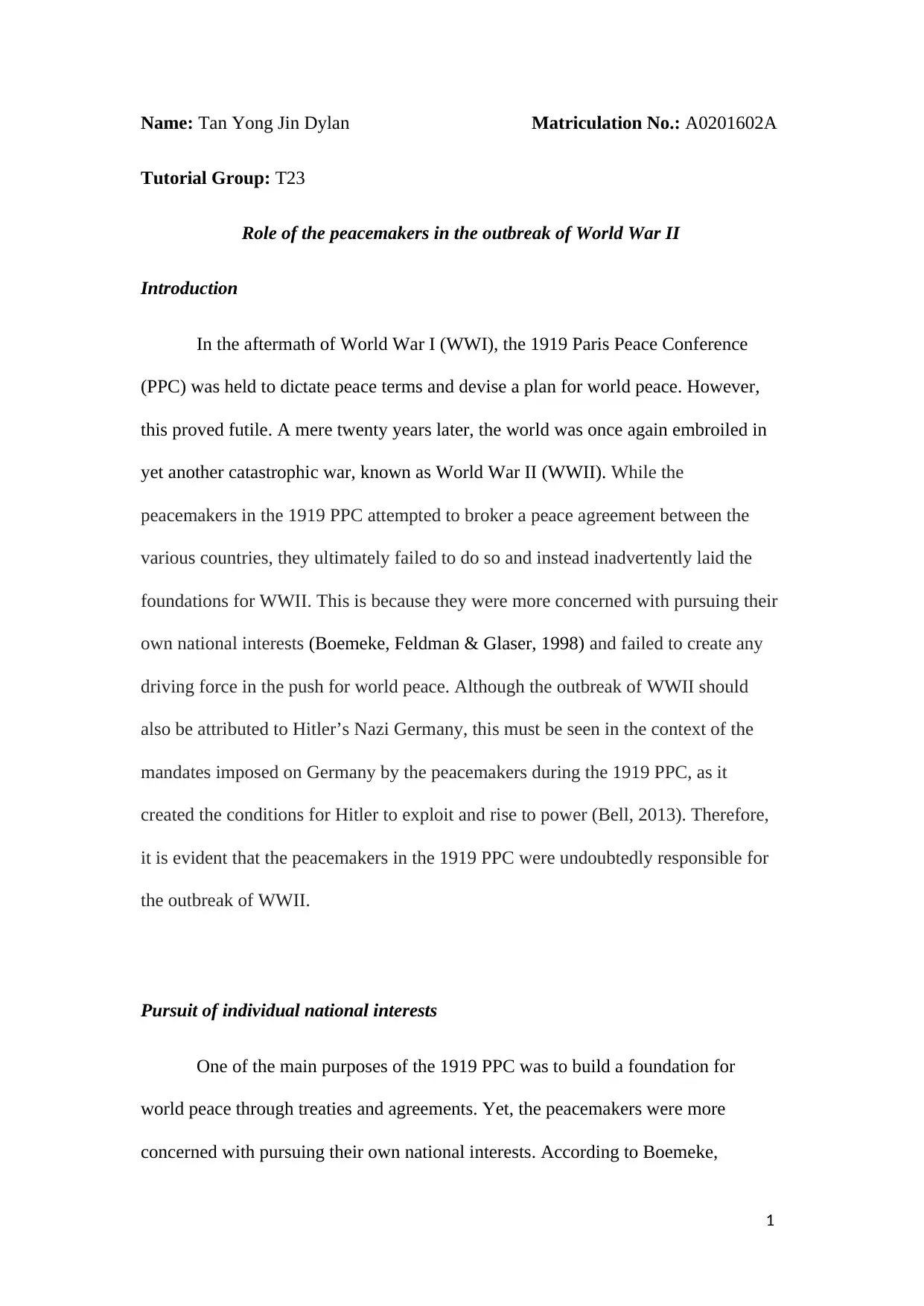
Name: Tan Yong Jin Dylan Matriculation No.: A0201602A
Tutorial Group: T23
Role of the peacemakers in the outbreak of World War II
Introduction
In the aftermath of World War I (WWI), the 1919 Paris Peace Conference
(PPC) was held to dictate peace terms and devise a plan for world peace. However,
this proved futile. A mere twenty years later, the world was once again embroiled in
yet another catastrophic war, known as World War II (WWII). While the
peacemakers in the 1919 PPC attempted to broker a peace agreement between the
various countries, they ultimately failed to do so and instead inadvertently laid the
foundations for WWII. This is because they were more concerned with pursuing their
own national interests (Boemeke, Feldman & Glaser, 1998) and failed to create any
driving force in the push for world peace. Although the outbreak of WWII should
also be attributed to Hitler’s Nazi Germany, this must be seen in the context of the
mandates imposed on Germany by the peacemakers during the 1919 PPC, as it
created the conditions for Hitler to exploit and rise to power (Bell, 2013). Therefore,
it is evident that the peacemakers in the 1919 PPC were undoubtedly responsible for
the outbreak of WWII.
Pursuit of individual national interests
One of the main purposes of the 1919 PPC was to build a foundation for
world peace through treaties and agreements. Yet, the peacemakers were more
concerned with pursuing their own national interests. According to Boemeke,
1
Tutorial Group: T23
Role of the peacemakers in the outbreak of World War II
Introduction
In the aftermath of World War I (WWI), the 1919 Paris Peace Conference
(PPC) was held to dictate peace terms and devise a plan for world peace. However,
this proved futile. A mere twenty years later, the world was once again embroiled in
yet another catastrophic war, known as World War II (WWII). While the
peacemakers in the 1919 PPC attempted to broker a peace agreement between the
various countries, they ultimately failed to do so and instead inadvertently laid the
foundations for WWII. This is because they were more concerned with pursuing their
own national interests (Boemeke, Feldman & Glaser, 1998) and failed to create any
driving force in the push for world peace. Although the outbreak of WWII should
also be attributed to Hitler’s Nazi Germany, this must be seen in the context of the
mandates imposed on Germany by the peacemakers during the 1919 PPC, as it
created the conditions for Hitler to exploit and rise to power (Bell, 2013). Therefore,
it is evident that the peacemakers in the 1919 PPC were undoubtedly responsible for
the outbreak of WWII.
Pursuit of individual national interests
One of the main purposes of the 1919 PPC was to build a foundation for
world peace through treaties and agreements. Yet, the peacemakers were more
concerned with pursuing their own national interests. According to Boemeke,
1
Paraphrase This Document
Need a fresh take? Get an instant paraphrase of this document with our AI Paraphraser
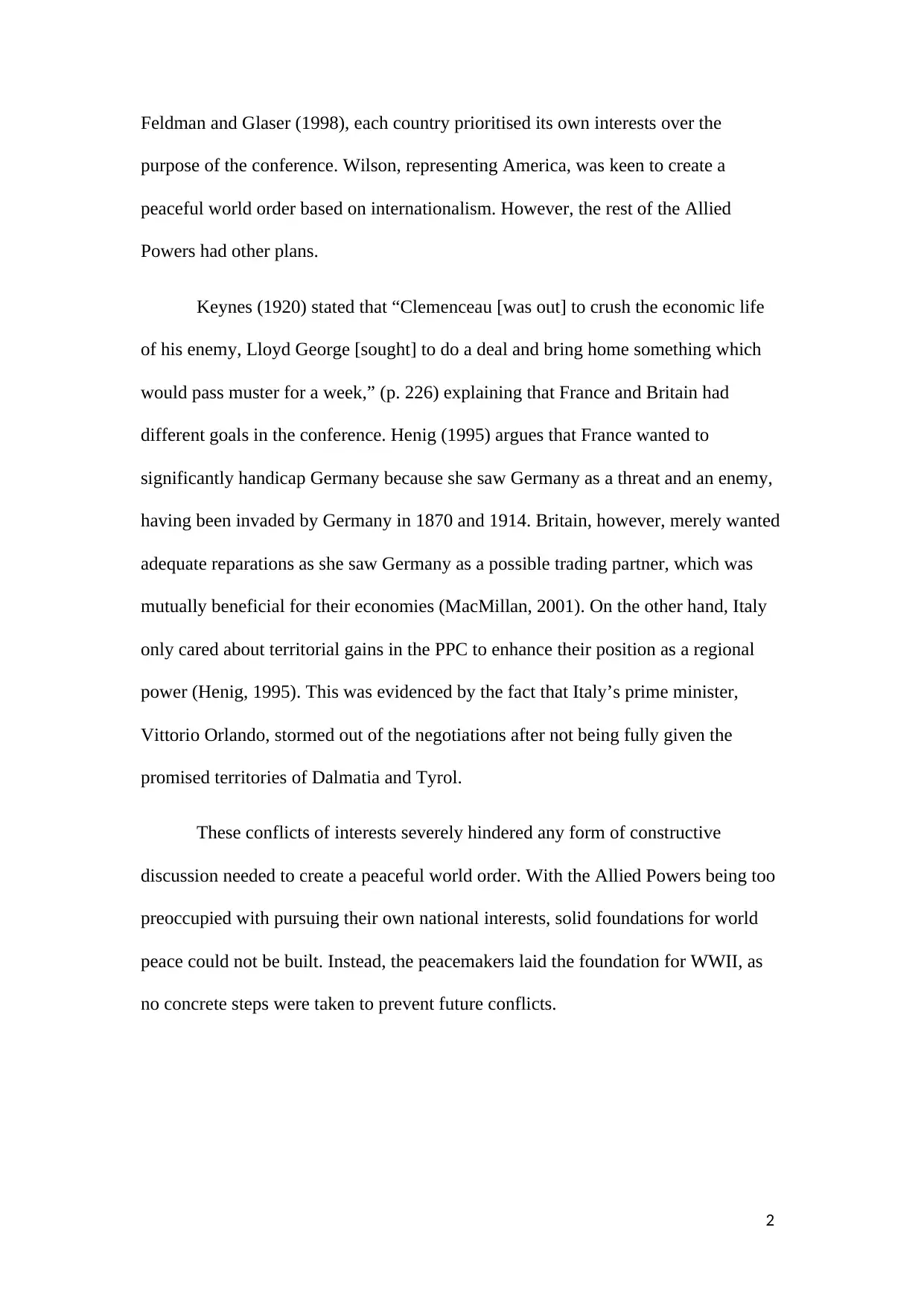
Feldman and Glaser (1998), each country prioritised its own interests over the
purpose of the conference. Wilson, representing America, was keen to create a
peaceful world order based on internationalism. However, the rest of the Allied
Powers had other plans.
Keynes (1920) stated that “Clemenceau [was out] to crush the economic life
of his enemy, Lloyd George [sought] to do a deal and bring home something which
would pass muster for a week,” (p. 226) explaining that France and Britain had
different goals in the conference. Henig (1995) argues that France wanted to
significantly handicap Germany because she saw Germany as a threat and an enemy,
having been invaded by Germany in 1870 and 1914. Britain, however, merely wanted
adequate reparations as she saw Germany as a possible trading partner, which was
mutually beneficial for their economies (MacMillan, 2001). On the other hand, Italy
only cared about territorial gains in the PPC to enhance their position as a regional
power (Henig, 1995). This was evidenced by the fact that Italy’s prime minister,
Vittorio Orlando, stormed out of the negotiations after not being fully given the
promised territories of Dalmatia and Tyrol.
These conflicts of interests severely hindered any form of constructive
discussion needed to create a peaceful world order. With the Allied Powers being too
preoccupied with pursuing their own national interests, solid foundations for world
peace could not be built. Instead, the peacemakers laid the foundation for WWII, as
no concrete steps were taken to prevent future conflicts.
2
purpose of the conference. Wilson, representing America, was keen to create a
peaceful world order based on internationalism. However, the rest of the Allied
Powers had other plans.
Keynes (1920) stated that “Clemenceau [was out] to crush the economic life
of his enemy, Lloyd George [sought] to do a deal and bring home something which
would pass muster for a week,” (p. 226) explaining that France and Britain had
different goals in the conference. Henig (1995) argues that France wanted to
significantly handicap Germany because she saw Germany as a threat and an enemy,
having been invaded by Germany in 1870 and 1914. Britain, however, merely wanted
adequate reparations as she saw Germany as a possible trading partner, which was
mutually beneficial for their economies (MacMillan, 2001). On the other hand, Italy
only cared about territorial gains in the PPC to enhance their position as a regional
power (Henig, 1995). This was evidenced by the fact that Italy’s prime minister,
Vittorio Orlando, stormed out of the negotiations after not being fully given the
promised territories of Dalmatia and Tyrol.
These conflicts of interests severely hindered any form of constructive
discussion needed to create a peaceful world order. With the Allied Powers being too
preoccupied with pursuing their own national interests, solid foundations for world
peace could not be built. Instead, the peacemakers laid the foundation for WWII, as
no concrete steps were taken to prevent future conflicts.
2
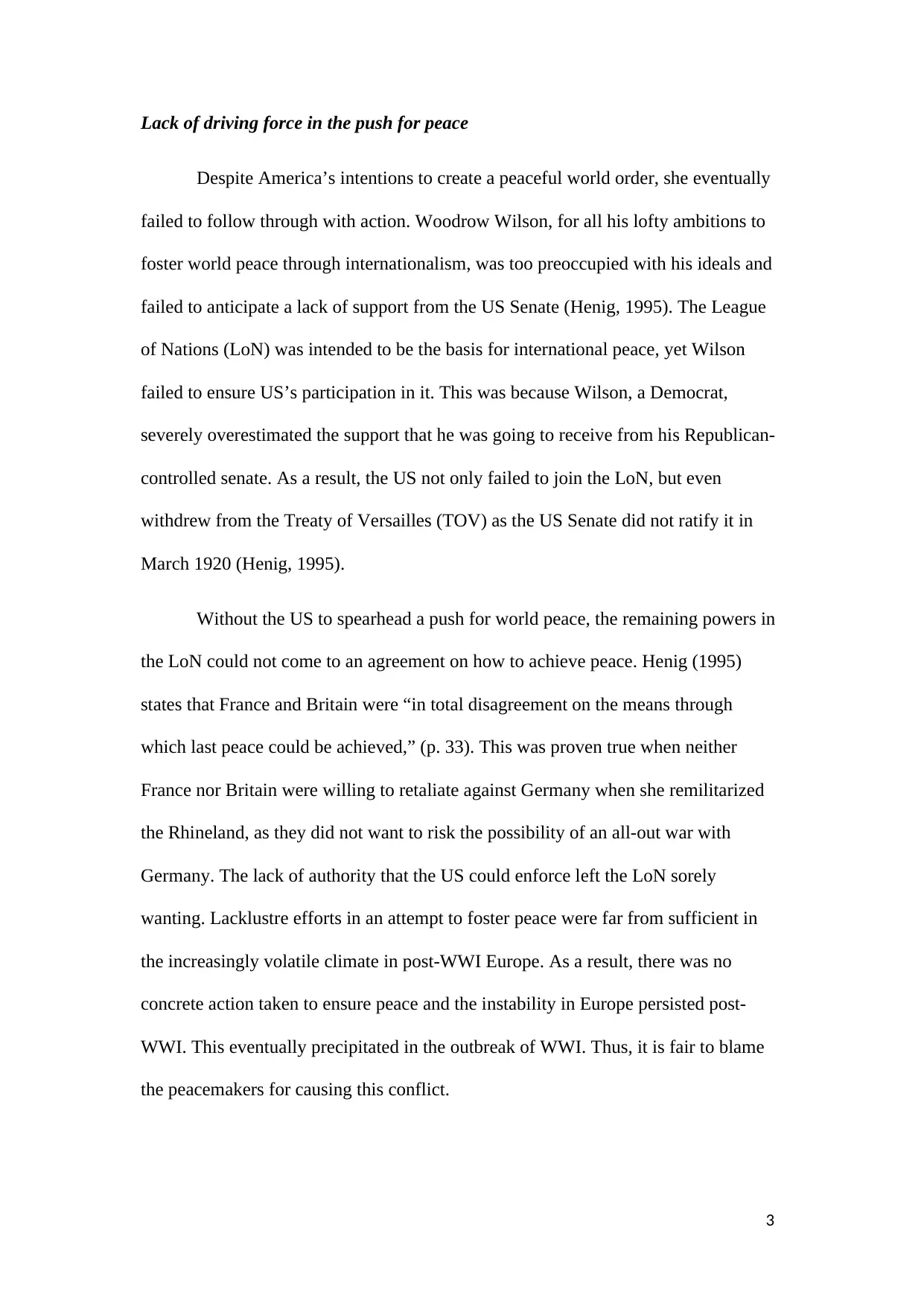
Lack of driving force in the push for peace
Despite America’s intentions to create a peaceful world order, she eventually
failed to follow through with action. Woodrow Wilson, for all his lofty ambitions to
foster world peace through internationalism, was too preoccupied with his ideals and
failed to anticipate a lack of support from the US Senate (Henig, 1995). The League
of Nations (LoN) was intended to be the basis for international peace, yet Wilson
failed to ensure US’s participation in it. This was because Wilson, a Democrat,
severely overestimated the support that he was going to receive from his Republican-
controlled senate. As a result, the US not only failed to join the LoN, but even
withdrew from the Treaty of Versailles (TOV) as the US Senate did not ratify it in
March 1920 (Henig, 1995).
Without the US to spearhead a push for world peace, the remaining powers in
the LoN could not come to an agreement on how to achieve peace. Henig (1995)
states that France and Britain were “in total disagreement on the means through
which last peace could be achieved,” (p. 33). This was proven true when neither
France nor Britain were willing to retaliate against Germany when she remilitarized
the Rhineland, as they did not want to risk the possibility of an all-out war with
Germany. The lack of authority that the US could enforce left the LoN sorely
wanting. Lacklustre efforts in an attempt to foster peace were far from sufficient in
the increasingly volatile climate in post-WWI Europe. As a result, there was no
concrete action taken to ensure peace and the instability in Europe persisted post-
WWI. This eventually precipitated in the outbreak of WWI. Thus, it is fair to blame
the peacemakers for causing this conflict.
3
Despite America’s intentions to create a peaceful world order, she eventually
failed to follow through with action. Woodrow Wilson, for all his lofty ambitions to
foster world peace through internationalism, was too preoccupied with his ideals and
failed to anticipate a lack of support from the US Senate (Henig, 1995). The League
of Nations (LoN) was intended to be the basis for international peace, yet Wilson
failed to ensure US’s participation in it. This was because Wilson, a Democrat,
severely overestimated the support that he was going to receive from his Republican-
controlled senate. As a result, the US not only failed to join the LoN, but even
withdrew from the Treaty of Versailles (TOV) as the US Senate did not ratify it in
March 1920 (Henig, 1995).
Without the US to spearhead a push for world peace, the remaining powers in
the LoN could not come to an agreement on how to achieve peace. Henig (1995)
states that France and Britain were “in total disagreement on the means through
which last peace could be achieved,” (p. 33). This was proven true when neither
France nor Britain were willing to retaliate against Germany when she remilitarized
the Rhineland, as they did not want to risk the possibility of an all-out war with
Germany. The lack of authority that the US could enforce left the LoN sorely
wanting. Lacklustre efforts in an attempt to foster peace were far from sufficient in
the increasingly volatile climate in post-WWI Europe. As a result, there was no
concrete action taken to ensure peace and the instability in Europe persisted post-
WWI. This eventually precipitated in the outbreak of WWI. Thus, it is fair to blame
the peacemakers for causing this conflict.
3
⊘ This is a preview!⊘
Do you want full access?
Subscribe today to unlock all pages.

Trusted by 1+ million students worldwide
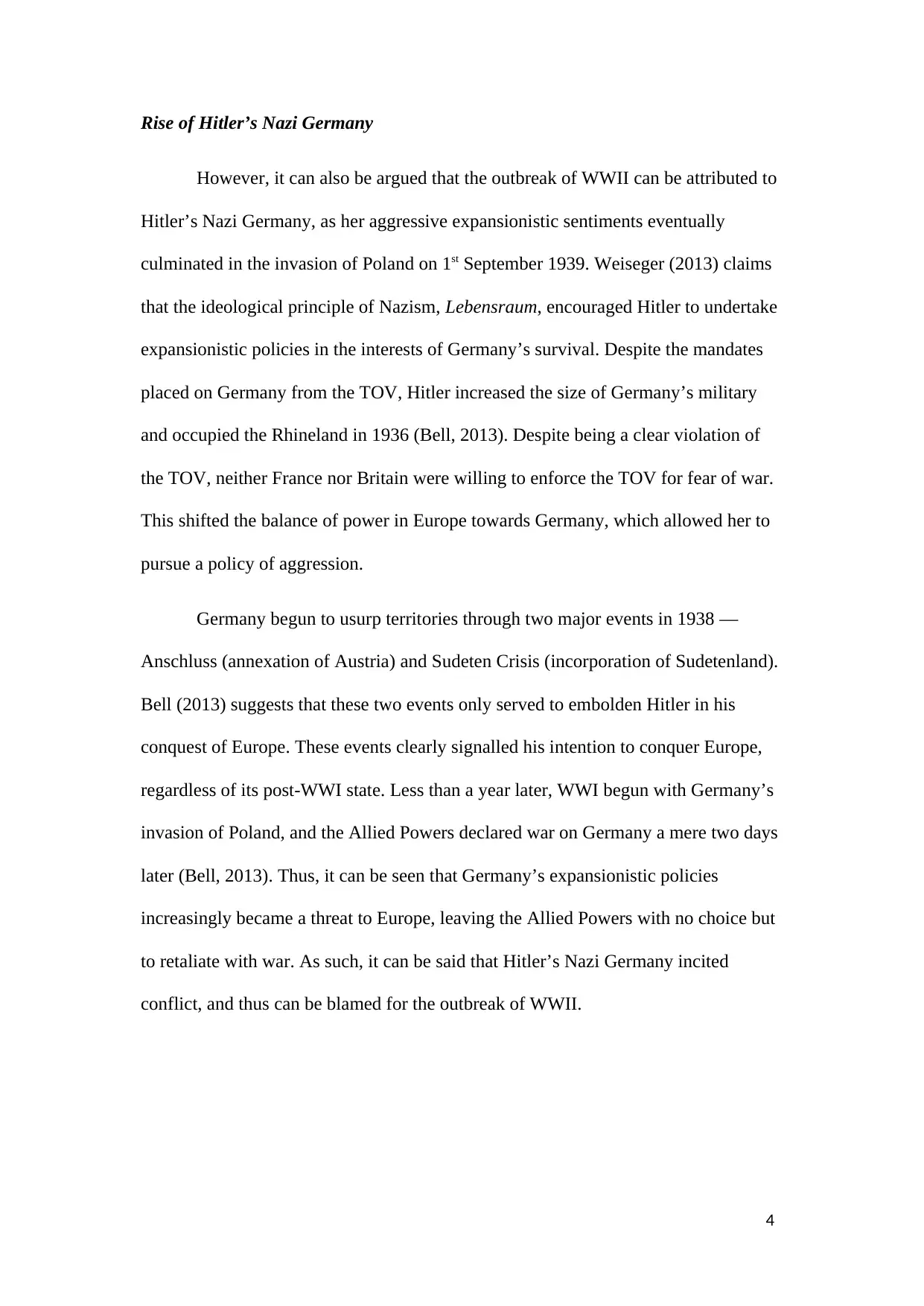
Rise of Hitler’s Nazi Germany
However, it can also be argued that the outbreak of WWII can be attributed to
Hitler’s Nazi Germany, as her aggressive expansionistic sentiments eventually
culminated in the invasion of Poland on 1st September 1939. Weiseger (2013) claims
that the ideological principle of Nazism, Lebensraum, encouraged Hitler to undertake
expansionistic policies in the interests of Germany’s survival. Despite the mandates
placed on Germany from the TOV, Hitler increased the size of Germany’s military
and occupied the Rhineland in 1936 (Bell, 2013). Despite being a clear violation of
the TOV, neither France nor Britain were willing to enforce the TOV for fear of war.
This shifted the balance of power in Europe towards Germany, which allowed her to
pursue a policy of aggression.
Germany begun to usurp territories through two major events in 1938 —
Anschluss (annexation of Austria) and Sudeten Crisis (incorporation of Sudetenland).
Bell (2013) suggests that these two events only served to embolden Hitler in his
conquest of Europe. These events clearly signalled his intention to conquer Europe,
regardless of its post-WWI state. Less than a year later, WWI begun with Germany’s
invasion of Poland, and the Allied Powers declared war on Germany a mere two days
later (Bell, 2013). Thus, it can be seen that Germany’s expansionistic policies
increasingly became a threat to Europe, leaving the Allied Powers with no choice but
to retaliate with war. As such, it can be said that Hitler’s Nazi Germany incited
conflict, and thus can be blamed for the outbreak of WWII.
4
However, it can also be argued that the outbreak of WWII can be attributed to
Hitler’s Nazi Germany, as her aggressive expansionistic sentiments eventually
culminated in the invasion of Poland on 1st September 1939. Weiseger (2013) claims
that the ideological principle of Nazism, Lebensraum, encouraged Hitler to undertake
expansionistic policies in the interests of Germany’s survival. Despite the mandates
placed on Germany from the TOV, Hitler increased the size of Germany’s military
and occupied the Rhineland in 1936 (Bell, 2013). Despite being a clear violation of
the TOV, neither France nor Britain were willing to enforce the TOV for fear of war.
This shifted the balance of power in Europe towards Germany, which allowed her to
pursue a policy of aggression.
Germany begun to usurp territories through two major events in 1938 —
Anschluss (annexation of Austria) and Sudeten Crisis (incorporation of Sudetenland).
Bell (2013) suggests that these two events only served to embolden Hitler in his
conquest of Europe. These events clearly signalled his intention to conquer Europe,
regardless of its post-WWI state. Less than a year later, WWI begun with Germany’s
invasion of Poland, and the Allied Powers declared war on Germany a mere two days
later (Bell, 2013). Thus, it can be seen that Germany’s expansionistic policies
increasingly became a threat to Europe, leaving the Allied Powers with no choice but
to retaliate with war. As such, it can be said that Hitler’s Nazi Germany incited
conflict, and thus can be blamed for the outbreak of WWII.
4
Paraphrase This Document
Need a fresh take? Get an instant paraphrase of this document with our AI Paraphraser
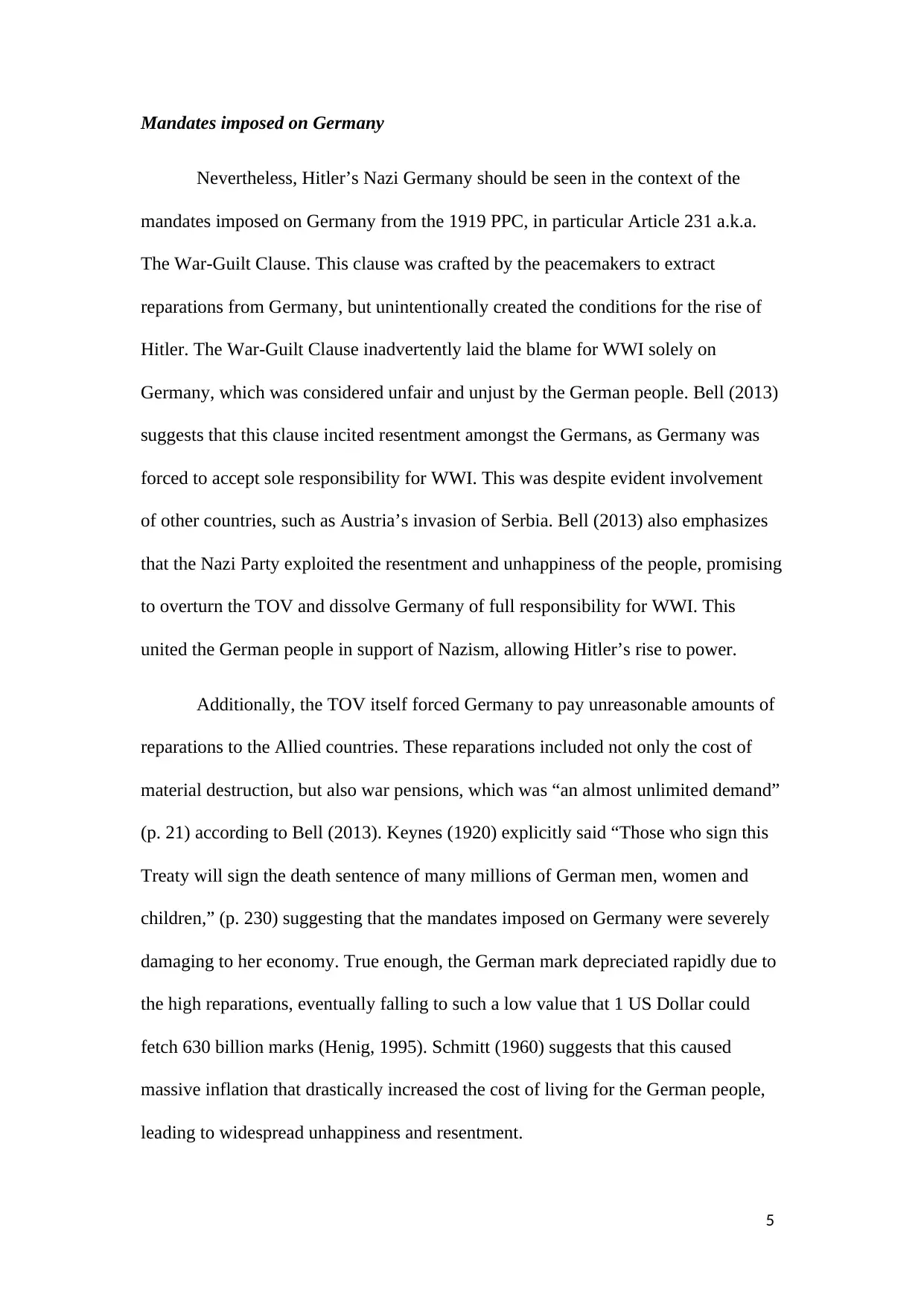
Mandates imposed on Germany
Nevertheless, Hitler’s Nazi Germany should be seen in the context of the
mandates imposed on Germany from the 1919 PPC, in particular Article 231 a.k.a.
The War-Guilt Clause. This clause was crafted by the peacemakers to extract
reparations from Germany, but unintentionally created the conditions for the rise of
Hitler. The War-Guilt Clause inadvertently laid the blame for WWI solely on
Germany, which was considered unfair and unjust by the German people. Bell (2013)
suggests that this clause incited resentment amongst the Germans, as Germany was
forced to accept sole responsibility for WWI. This was despite evident involvement
of other countries, such as Austria’s invasion of Serbia. Bell (2013) also emphasizes
that the Nazi Party exploited the resentment and unhappiness of the people, promising
to overturn the TOV and dissolve Germany of full responsibility for WWI. This
united the German people in support of Nazism, allowing Hitler’s rise to power.
Additionally, the TOV itself forced Germany to pay unreasonable amounts of
reparations to the Allied countries. These reparations included not only the cost of
material destruction, but also war pensions, which was “an almost unlimited demand”
(p. 21) according to Bell (2013). Keynes (1920) explicitly said “Those who sign this
Treaty will sign the death sentence of many millions of German men, women and
children,” (p. 230) suggesting that the mandates imposed on Germany were severely
damaging to her economy. True enough, the German mark depreciated rapidly due to
the high reparations, eventually falling to such a low value that 1 US Dollar could
fetch 630 billion marks (Henig, 1995). Schmitt (1960) suggests that this caused
massive inflation that drastically increased the cost of living for the German people,
leading to widespread unhappiness and resentment.
5
Nevertheless, Hitler’s Nazi Germany should be seen in the context of the
mandates imposed on Germany from the 1919 PPC, in particular Article 231 a.k.a.
The War-Guilt Clause. This clause was crafted by the peacemakers to extract
reparations from Germany, but unintentionally created the conditions for the rise of
Hitler. The War-Guilt Clause inadvertently laid the blame for WWI solely on
Germany, which was considered unfair and unjust by the German people. Bell (2013)
suggests that this clause incited resentment amongst the Germans, as Germany was
forced to accept sole responsibility for WWI. This was despite evident involvement
of other countries, such as Austria’s invasion of Serbia. Bell (2013) also emphasizes
that the Nazi Party exploited the resentment and unhappiness of the people, promising
to overturn the TOV and dissolve Germany of full responsibility for WWI. This
united the German people in support of Nazism, allowing Hitler’s rise to power.
Additionally, the TOV itself forced Germany to pay unreasonable amounts of
reparations to the Allied countries. These reparations included not only the cost of
material destruction, but also war pensions, which was “an almost unlimited demand”
(p. 21) according to Bell (2013). Keynes (1920) explicitly said “Those who sign this
Treaty will sign the death sentence of many millions of German men, women and
children,” (p. 230) suggesting that the mandates imposed on Germany were severely
damaging to her economy. True enough, the German mark depreciated rapidly due to
the high reparations, eventually falling to such a low value that 1 US Dollar could
fetch 630 billion marks (Henig, 1995). Schmitt (1960) suggests that this caused
massive inflation that drastically increased the cost of living for the German people,
leading to widespread unhappiness and resentment.
5
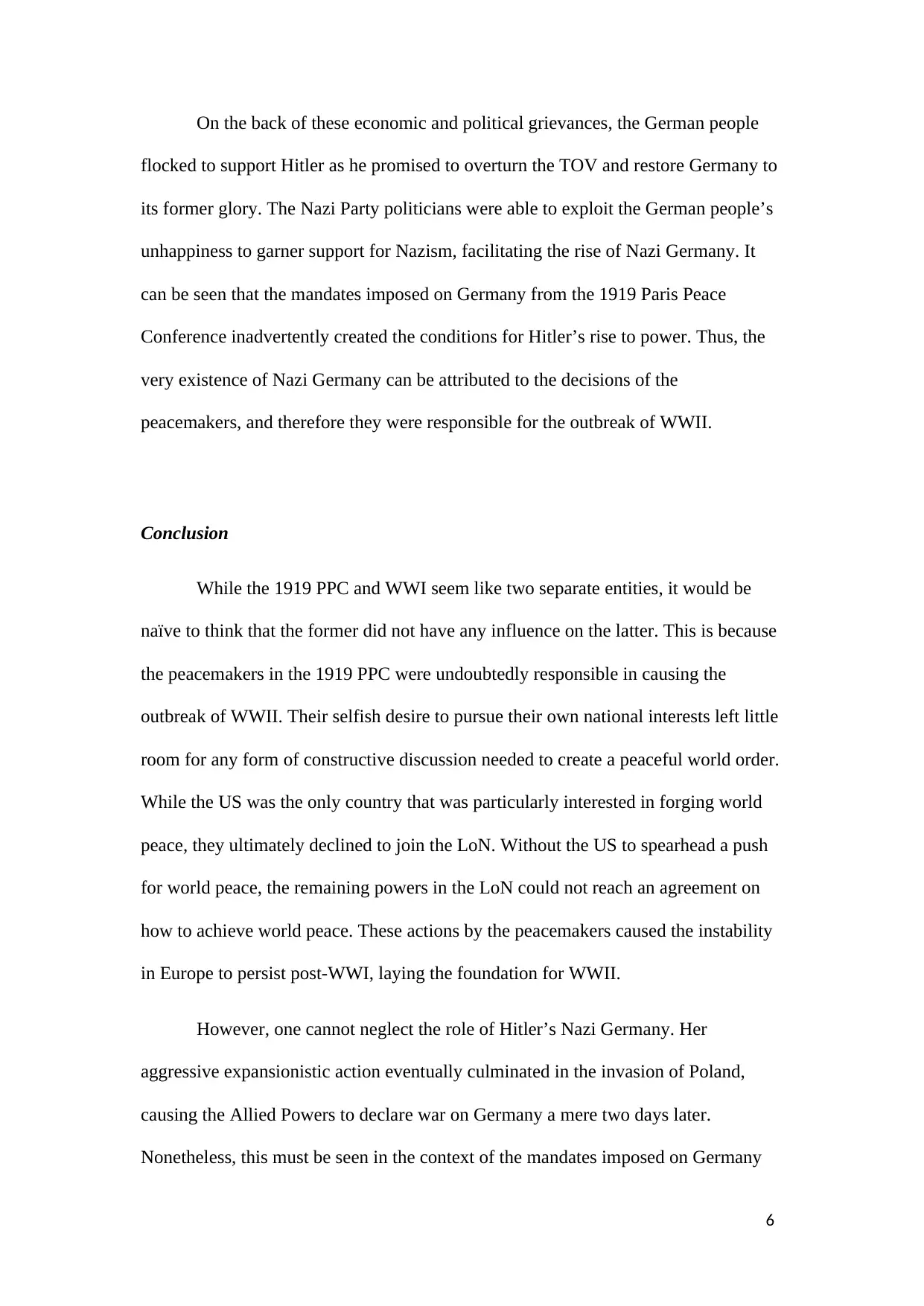
On the back of these economic and political grievances, the German people
flocked to support Hitler as he promised to overturn the TOV and restore Germany to
its former glory. The Nazi Party politicians were able to exploit the German people’s
unhappiness to garner support for Nazism, facilitating the rise of Nazi Germany. It
can be seen that the mandates imposed on Germany from the 1919 Paris Peace
Conference inadvertently created the conditions for Hitler’s rise to power. Thus, the
very existence of Nazi Germany can be attributed to the decisions of the
peacemakers, and therefore they were responsible for the outbreak of WWII.
Conclusion
While the 1919 PPC and WWI seem like two separate entities, it would be
naïve to think that the former did not have any influence on the latter. This is because
the peacemakers in the 1919 PPC were undoubtedly responsible in causing the
outbreak of WWII. Their selfish desire to pursue their own national interests left little
room for any form of constructive discussion needed to create a peaceful world order.
While the US was the only country that was particularly interested in forging world
peace, they ultimately declined to join the LoN. Without the US to spearhead a push
for world peace, the remaining powers in the LoN could not reach an agreement on
how to achieve world peace. These actions by the peacemakers caused the instability
in Europe to persist post-WWI, laying the foundation for WWII.
However, one cannot neglect the role of Hitler’s Nazi Germany. Her
aggressive expansionistic action eventually culminated in the invasion of Poland,
causing the Allied Powers to declare war on Germany a mere two days later.
Nonetheless, this must be seen in the context of the mandates imposed on Germany
6
flocked to support Hitler as he promised to overturn the TOV and restore Germany to
its former glory. The Nazi Party politicians were able to exploit the German people’s
unhappiness to garner support for Nazism, facilitating the rise of Nazi Germany. It
can be seen that the mandates imposed on Germany from the 1919 Paris Peace
Conference inadvertently created the conditions for Hitler’s rise to power. Thus, the
very existence of Nazi Germany can be attributed to the decisions of the
peacemakers, and therefore they were responsible for the outbreak of WWII.
Conclusion
While the 1919 PPC and WWI seem like two separate entities, it would be
naïve to think that the former did not have any influence on the latter. This is because
the peacemakers in the 1919 PPC were undoubtedly responsible in causing the
outbreak of WWII. Their selfish desire to pursue their own national interests left little
room for any form of constructive discussion needed to create a peaceful world order.
While the US was the only country that was particularly interested in forging world
peace, they ultimately declined to join the LoN. Without the US to spearhead a push
for world peace, the remaining powers in the LoN could not reach an agreement on
how to achieve world peace. These actions by the peacemakers caused the instability
in Europe to persist post-WWI, laying the foundation for WWII.
However, one cannot neglect the role of Hitler’s Nazi Germany. Her
aggressive expansionistic action eventually culminated in the invasion of Poland,
causing the Allied Powers to declare war on Germany a mere two days later.
Nonetheless, this must be seen in the context of the mandates imposed on Germany
6
⊘ This is a preview!⊘
Do you want full access?
Subscribe today to unlock all pages.

Trusted by 1+ million students worldwide
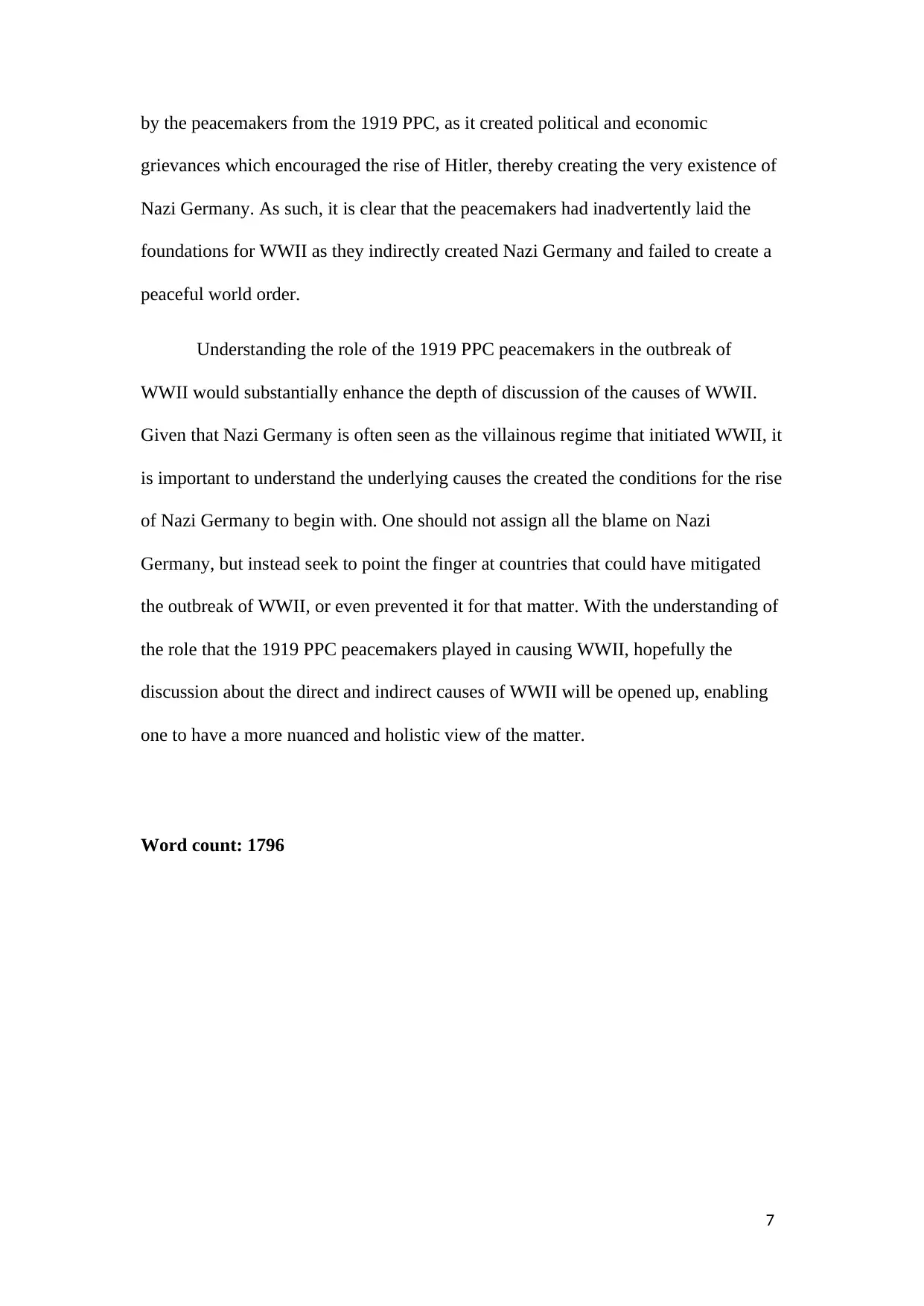
by the peacemakers from the 1919 PPC, as it created political and economic
grievances which encouraged the rise of Hitler, thereby creating the very existence of
Nazi Germany. As such, it is clear that the peacemakers had inadvertently laid the
foundations for WWII as they indirectly created Nazi Germany and failed to create a
peaceful world order.
Understanding the role of the 1919 PPC peacemakers in the outbreak of
WWII would substantially enhance the depth of discussion of the causes of WWII.
Given that Nazi Germany is often seen as the villainous regime that initiated WWII, it
is important to understand the underlying causes the created the conditions for the rise
of Nazi Germany to begin with. One should not assign all the blame on Nazi
Germany, but instead seek to point the finger at countries that could have mitigated
the outbreak of WWII, or even prevented it for that matter. With the understanding of
the role that the 1919 PPC peacemakers played in causing WWII, hopefully the
discussion about the direct and indirect causes of WWII will be opened up, enabling
one to have a more nuanced and holistic view of the matter.
Word count: 1796
7
grievances which encouraged the rise of Hitler, thereby creating the very existence of
Nazi Germany. As such, it is clear that the peacemakers had inadvertently laid the
foundations for WWII as they indirectly created Nazi Germany and failed to create a
peaceful world order.
Understanding the role of the 1919 PPC peacemakers in the outbreak of
WWII would substantially enhance the depth of discussion of the causes of WWII.
Given that Nazi Germany is often seen as the villainous regime that initiated WWII, it
is important to understand the underlying causes the created the conditions for the rise
of Nazi Germany to begin with. One should not assign all the blame on Nazi
Germany, but instead seek to point the finger at countries that could have mitigated
the outbreak of WWII, or even prevented it for that matter. With the understanding of
the role that the 1919 PPC peacemakers played in causing WWII, hopefully the
discussion about the direct and indirect causes of WWII will be opened up, enabling
one to have a more nuanced and holistic view of the matter.
Word count: 1796
7
Paraphrase This Document
Need a fresh take? Get an instant paraphrase of this document with our AI Paraphraser
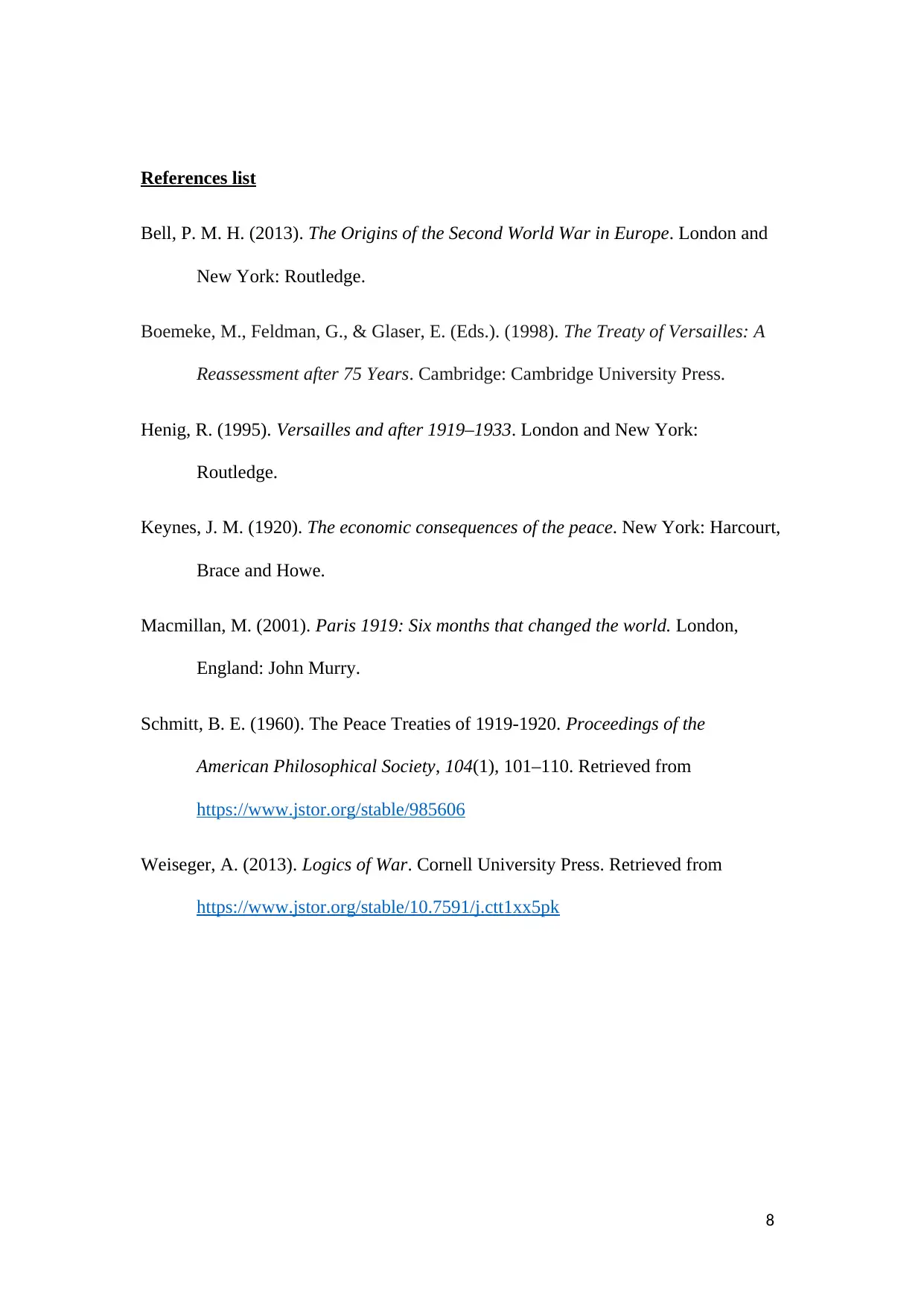
References list
Bell, P. M. H. (2013). The Origins of the Second World War in Europe. London and
New York: Routledge.
Boemeke, M., Feldman, G., & Glaser, E. (Eds.). (1998). The Treaty of Versailles: A
Reassessment after 75 Years. Cambridge: Cambridge University Press.
Henig, R. (1995). Versailles and after 1919–1933. London and New York:
Routledge.
Keynes, J. M. (1920). The economic consequences of the peace. New York: Harcourt,
Brace and Howe.
Macmillan, M. (2001). Paris 1919: Six months that changed the world. London,
England: John Murry.
Schmitt, B. E. (1960). The Peace Treaties of 1919-1920. Proceedings of the
American Philosophical Society, 104(1), 101–110. Retrieved from
https://www.jstor.org/stable/985606
Weiseger, A. (2013). Logics of War. Cornell University Press. Retrieved from
https://www.jstor.org/stable/10.7591/j.ctt1xx5pk
8
Bell, P. M. H. (2013). The Origins of the Second World War in Europe. London and
New York: Routledge.
Boemeke, M., Feldman, G., & Glaser, E. (Eds.). (1998). The Treaty of Versailles: A
Reassessment after 75 Years. Cambridge: Cambridge University Press.
Henig, R. (1995). Versailles and after 1919–1933. London and New York:
Routledge.
Keynes, J. M. (1920). The economic consequences of the peace. New York: Harcourt,
Brace and Howe.
Macmillan, M. (2001). Paris 1919: Six months that changed the world. London,
England: John Murry.
Schmitt, B. E. (1960). The Peace Treaties of 1919-1920. Proceedings of the
American Philosophical Society, 104(1), 101–110. Retrieved from
https://www.jstor.org/stable/985606
Weiseger, A. (2013). Logics of War. Cornell University Press. Retrieved from
https://www.jstor.org/stable/10.7591/j.ctt1xx5pk
8
1 out of 8
Your All-in-One AI-Powered Toolkit for Academic Success.
+13062052269
info@desklib.com
Available 24*7 on WhatsApp / Email
![[object Object]](/_next/static/media/star-bottom.7253800d.svg)
Unlock your academic potential
Copyright © 2020–2026 A2Z Services. All Rights Reserved. Developed and managed by ZUCOL.

